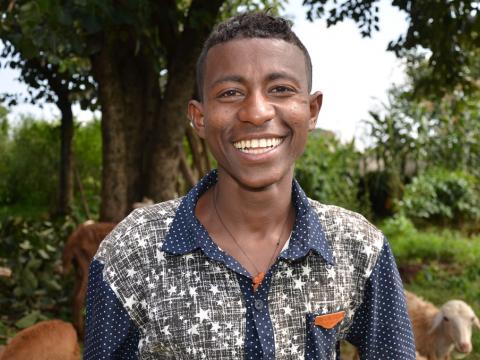From distressed and hopeless child labor to worthy and meaningful life

Workie Abere, 18, lives at Wonchet kebele some 35 km south of Bahir Dar. He lives with his family and his four younger brothers. His family’s livelihood is dependent on subsistence agriculture that could not be able to feed the family all year round adequately. As the first born of the family, Workie had no option than engaging himself into child labor so as to support his family.
Workie started experiencing the worst form of child labor at the age of six. He used to look after cattle for others and in return his parents were paid for the service he provided. During his elementary school time, he had to do some labor to generate an income for the family. He says, “If I was attending in the morning shift, I had to collect cow dung for sale in the afternoon and if the school was in the afternoon, I had to collect cow dung in the morning and gave it to my mother so that she sales and buys some bread for the family.”
There was no high school around where Workie lives. He had to travel to Zemera Village, 10 km from his village, and rent a house to attend the high school. When attending the school out there, he had to engage himself on daily labor to finance his house rent, food and school expense. He says, “I attend the school from Monday thru Friday. I also do some labor works at my spare time before and after school to cover my needs.”
Yet the income he earned working after and before school was not sufficient enough to cover all his needs. Hence, Workie had to work all the days and the nights of the weekend. He says, “I used to work from 7:00 AM in the morning to 5:00 PM in the afternoon on khat farm collecting fresh leaves and tops that people chew on the daytime of the weekends. I also used to work from 7:00 PM evening to 1:00 AM in the midnight on stone crushing mill on the nights of the weekends.”
Despite all his effort and scarification, Workie was not able to pass Grade 10 National Examination. He was desperate and leading meaningless life since then. “Life was tasteless for me after failing the exam. I was completely distressed and did not know what to do,” he sadly recalls.
World Vision Ethiopia through United States Department of Labor financial support began supporting children between ages of 14-17, who are either engaged or at-risk of labor exploitations to help them secure education services and/or alternative decent employment opportunities.
WV Ethiopia provided Workie and other children engaged or at-risk of labor exploitations training on fattening and rearing small ruminant cattle for three months. Workie started the fattening and rearing business with 4,500 Birr capital three years from now. Now his capital has grown to 30,000 Birr of which about 13,000 Birr is on his account. He says, “The business is lucrative. It has changed my life. I am able to support my younger brothers with school materials and clothes. I also purchase fertilizers and food for my family.”
“These sheep have helped me to forget all the worries I have gone through. I love them take care of them as I do for myself,” happily says Workie.
He is very grateful to World Vision staff. He says, “World Vision staff did not tell me only how I can make business. They strengthened my immature attitude and helped me to bring about attitudinal change. They helped me to develop self-confidence, be creative in my business and showed me true love. Now my distressed and hopeless life has changed to worthy and meaningful life. The staff was the real bridge for my life transformation.”
He has a dream to open a big fattening and rearing business in the future. He says, “World Vision training and support has awakened me from my desperate hope. I am now dreaming to be someone who can contribute some valuable asset in cattle fattening and rearing for my country. I vow that I will do all I can to support children who are engaged or at risk of child exploitation.”
Story by: Aklilu Kassaye
